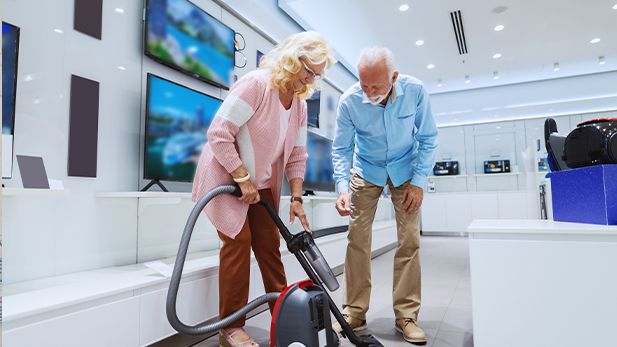Consumption: Will a vacuum cleaner make you as happy as a theatre ticket?

You probably have not noticed, but you are changing your behaviour. You are breaking a rule of thumb that researchers have based their work on for decades.
Until now, they have generally divided consumption into two main groups. Experiences which presumably bring you joy – whether you spoil yourself by buying a concert ticket, eating at a fancy restaurant, or getting your hair done. And material things which mainly target your practical needs and appeal more to objective facts and logic.
A vacuum cleaner with a monogram can get the job done but also brings joy
Georgios Halkias, Associate Professor
However, new research implies that these boundaries are blurring, and the purchase of a coffee mug, a t-shirt or a toolbox may activate the same level of happiness as the purchase of an experience.
Associate Professor Georgios Halkias from the Department of Marketing at CBS and colleagues Professor Flora Kokkinaki and Assistant Professor Sofia Kousi have carried out five sub-studies in Western European countries. Through qualitative interviews and quantitative experiments, they have reached this surprising conclusion. The results have been published in the international academic journal Psychology & Marketing.
Consumers buy pleasure
As the researchers explain it in the academic journal consumers want to be pleased. Such pleasure may derive from products which for many reasons stand out and create a special bond with the buyer. For example, it could be a coffee mug with a particular illustration or a t-shirt with the owner’s favourite band.
But it could also be a toolbox with a personal quote or a specially designed toaster.
”We asked people what purchases they remembered and what made them happy. Their answers surprised us because until now we have had a functional approach to everyday material products such as vacuum cleaners, coffee mugs and t-shirts. But it appears that consumers no longer buy such products for practical reasons only. A vacuum cleaner with a monogram can get the job done but also brings joy,” Georgios Halkias says and elaborates:
“The use of unique or unconventional designs or vibrant colours, stickers, personal badges and quote prints can increase the enjoyment and pleasure associated with a product. We already know this idea from products for children, where a toothbrush can be shaped like a giraffe’s neck to make it fun to use.”
Artists get involved
So, now it is all about manufacturers recognising the new trend for adults, and according to the CBS researcher, it is already starting.
”Alessi, the Italian company who manufactures kitchen utensils, mixes aesthetics and play with functionality. So does LG, who has involved artists in changing simple products to interesting, aesthetically appealing objects. For instance, a corkscrew that LG launched recently,” says Georgios Halkias.
”Our research indicates that more manufacturers need to start thinking like this. Additionally, in their communication strategies, marketing people need to be aware that material purchases are increasingly about feeling joy,” Georgios Halkias explains and adds:
”The boundaries between buying experiences and material things will blur, and boring products will change and become more personal.”
Read the research article in Psychology and Marketing: Hedonic objects and utilitarian experiences: The overriding influence of hedonism in driving consumer happiness - Kousi - 2023 - Psychology & Marketing - Wiley Online Library
